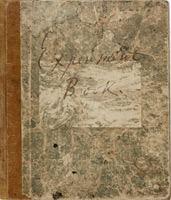The Darwin Archive
 |
|---|
| Darwin's experiment book in which he kept notes of botanical experiments conducted in his garden and greenhouse from 1855 to 1868. CUL DAR 157a |
The Darwin Archive in Cambridge University Library, with its hundreds of manuscripts and thousands of letters, is the documentary record of Darwin’s entire working life. It has had adventures of its own. Parcelled up and kept in trunks and cardboard boxes, dispersed, mislaid, rediscovered, and narrowly avoiding incineration, this collection provides a unique and remarkably comprehensive window into Darwin’s life and mind. Members of the Darwin family donated the core of the collection to the University Library in 1948. A missing ‘Black Box’, as it came to be called, containing a miscellaneous collection of papers and letters, as well as sheaves of Darwin’s working notes and all his pocket diaries, arrived in Cambridge in 1962. Another fifteen parcels containing more than 4,000 letters to Darwin were added to the Archive in 1975. Further gifts and acquisitions have brought the total manuscript collection to more than 80,000 individual items.
The Correspondence Project
The Darwin Correspondence Project, with its main base at Cambridge University Library, is a unique undertaking to research and publish all of Charles Darwin's 15,000 surviving letters, reuniting those in the CUL collection with others from collections all around the world. For Darwin, letters were a vital form of communicating with his scientific colleagues, discussing ideas, and gathering data.
Originally aimed chiefly at the scholarly community, the Darwin Correspondence Project team increasingly builds on its world-class expertise to make the letters accessible to a global audience from schoolchildren, through college students, to the general public. The letters, which cover every subject that Darwin researched, and were exchanged with nearly 2,000 correspondents from all walks of life all over the world, are not only an invaluable insight into Darwin's mind, but also offer the modern reader an engaging and accessible route into his published writings. The Correspondence Project's website satisfies the needs of academic researchers by providing complete transcripts of letters (around 5500 to date) produced to the highest scholarly standards, and supported by carefully researched explanatory notes. By presenting carefully selected letters on particular aspects of Darwin's life and science together with specially written contextual material, the Project aims to support education at all levels.

